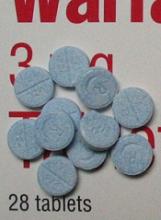New research suggests warfarin use may reduce the risk of cancer among people over the age of 50.
An observational study of more than 1 million people in Norway revealed that individuals who took warfarin had a lower incidence of cancers overall, as well as certain types of cancers, than people who did not take warfarin.
James B. Lorens, PhD, of the University of Bergen in Norway, and his colleagues reported these findings in JAMA Internal Medicine.
The researchers analyzed data from the Norwegian National Registry, the Norwegian Prescription Database, and the Cancer Registry of Norway.
This included data for all individuals ages 52 to 82 who were living in Norway from January 1, 2006, through December 31, 2012, (n=1,256,725).
The researchers looked for cancer diagnoses in this group during the 7-year observation period. They compared the incidence of any new cancer (including certain cancer types) between warfarin users and non-users.
People were considered warfarin users if they had taken at least 6 months of a warfarin prescription and at least 2 years had elapsed from their first prescription to any cancer diagnosis.
Most study subjects were non-users (92.6%, n=1,163,783), but 7.4% (n=92,942) were warfarin users.
The researchers noted that warfarin users were older than non-users, with mean ages of 70.2 and 63.9, respectively. Warfarin users were also more likely to be male (61.7%; n=57,370) and non-users female (52.7%; n=613,803).
The incidence of cancer was 10.6% (n=132,687) in the entire study cohort, 9.4% (n=8754) among warfarin users, and 10.6% (n=123,933) among non-users. The most common cancer types were prostate, lung, colon, and breast.
The researchers found a significantly lower age- and sex-adjusted incidence rate ratio (IRR) for all cancers among warfarin users than nonusers. The IRR was 0.84 (95% CI, 0.82-0.86).
The IRR was also significantly lower among users than non-users for 3 of the 4 most common cancers. The IRR was 0.69 (95% CI, 0.65-0.72) for prostate cancer, 0.80 (95% CI, 0.75-0.86) for lung cancer, and 0.90 (95% CI, 0.82-1.00) for female breast cancer.
The researchers said there was no significant difference between users and non-users for colon cancer. The IRR was 0.99 (95% CI, 0.93-1.06).
The team also assessed hematologic malignancies. The IRRs, for users compared to non-users, were as follows:
- 0.99 (95% CI, 0.89-1.11) for leukemia
- 0.89 (95% CI, 0.71-1.11) for chronic lymphocytic leukemia
- 0.70 (95% CI, 0.51-0.98) for acute myeloid leukemia
- 0.92 (95% CI, 0.82-1.04) for lymphoma
- 0.66 (95% CI, 0.34-1.26) for Hodgkin lymphoma
- 0.92 (95% CI, 0.81-1.04) for non-Hodgkin lymphoma.
The researchers noted that they did not collect information on other medications subjects were taking or risk factors that might influence cancer development, and new cancers may have been cancer recurrences.
In addition, the team said the prescription of warfarin may be a marker for other healthcare factors that lead to cancer prevention.
Still, the researchers said warfarin appeared to be associated with reduced cancer risk in this study.
They therefore believe this finding could have implications for choosing anticoagulants, although additional research is needed.


